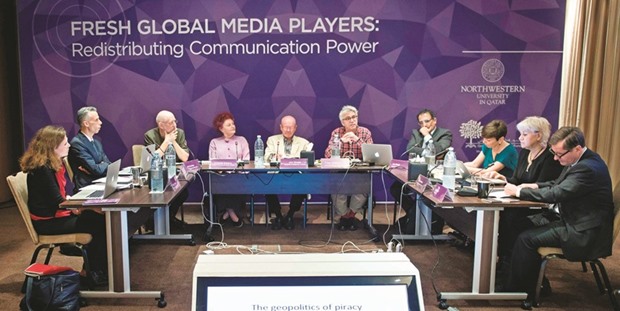Research at Northwestern University in Qatar (NU-Q) on new global media players has been showcased in a special section of a leading academic journal.
The ‘International Journal of Communication (IJC)’ has published a special section to its most recent edition on “Global Communication Power: Shift or Stasis?,” which is drawn from an NU-Q conference on “Fresh Global Media Players” held in February 2015.
The monograph-length publication explores changing patterns and redistribution of “communication power” and features some of the world’s top media scholars and professionals who came to Doha for the conference sessions and subsequently produced the journal articles.
Once the purview of leading industrial nations only, media industries now span the globe and have cropped up in developing nations as well. Nations like Qatar and Brazil have two of the world’s most potent satellite television networks, for example.
Leading both the conference and the special section were two NU-Q faculty members who are global media experts – Joe Khalil, associate professor of communication in residence, and John Downing, a visiting professor of communication.
Both initiatives were also supported by a grant from the Conference and Workshop Sponsorship Programme of the Qatar National Research Fund.
“The landscape of news and entertainment has undergone a radical transformation over the past decade,” Everette E Dennis, dean and CEO of NU-Q, said.
“Today as people around the world watch content that is produced or influenced by the Middle East, and as the Arab world has joined the global conversation with a clear and distinct voice, it is an honour for NU-Q faculty to be recognised for their expertise in global media,” the dean added.
The special section in the IJC includes original articles, a feature, and an editorial introduction – all from scholars around the world who have expertise in the respective fields.
The IJC is a peer-reviewed online, multi-media, academic journal that adheres to the highest standards of peer review and engages established and emerging scholars from anywhere in the world.
According to the latest statistics from Google Scholar, it ranks 15th among all humanities, literature and art journals and 7th among communication journals.
In their editorial introduction, Khalil and Downing, write that contributors to the symposium and the IJC “… these studies, beyond their information value, also serve as valuable methodological in global media shifts.”
This special section “does not simply zero in on news or entertainment or advertising or media firms but engages with all these dimensions and others not institutionally structured.”
Among the contributors is Ann Geniets, Oxford University, who writes on “Engaging Youth in Low- and Middle-Income Countries Through Chat Apps: Challenges and Opportunities for International News Organisations.”
At the symposium in 2015, Geniets had declared that chat apps like WhatsApp may help big broadcasters such as the BBC engage and connect emotionally with a new generation.
Presenting the findings of her own research on the topic, Geniets said, “I believe this could potentially become one of most transformative developments in the history of global media players.”

NU-Q’s ‘Fresh Global Media Players Conference.’
